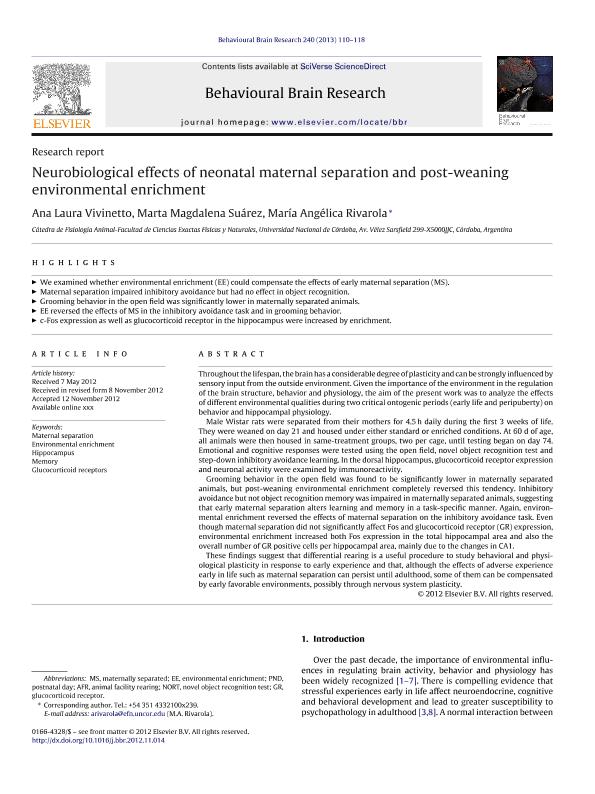Artículo
Neurobiological effects of neonatal maternal separation and post-weaning environmental enrichment
Fecha de publicación:
03/2013
Editorial:
Elsevier Science
Revista:
Behavioural Brain Research
ISSN:
0166-4328
Idioma:
Inglés
Tipo de recurso:
Artículo publicado
Clasificación temática:
Resumen
Throughout the lifespan, the brain has a considerable degree of plasticity and can be strongly influenced by sensory input from the outside environment. Given the importance of the environment in the regulation of the brain structure, behavior and physiology, the aim of the present work was to analyze the effects of different environmental qualities during two critical ontogenic periods (early life and peripuberty) on behavior and hippocampal physiology.Male Wistar rats were separated from their mothers for 4.5. h daily during the first 3 weeks of life. They were weaned on day 21 and housed under either standard or enriched conditions. At 60 d of age, all animals were then housed in same-treatment groups, two per cage, until testing began on day 74. Emotional and cognitive responses were tested using the open field, novel object recognition test and step-down inhibitory avoidance learning. In the dorsal hippocampus, glucocorticoid receptor expression and neuronal activity were examined by immunoreactivity.Grooming behavior in the open field was found to be significantly lower in maternally separated animals, but post-weaning environmental enrichment completely reversed this tendency. Inhibitory avoidance but not object recognition memory was impaired in maternally separated animals, suggesting that early maternal separation alters learning and memory in a task-specific manner. Again, environmental enrichment reversed the effects of maternal separation on the inhibitory avoidance task. Even though maternal separation did not significantly affect Fos and glucocorticoid receptor (GR) expression, environmental enrichment increased both Fos expression in the total hippocampal area and also the overall number of GR positive cells per hippocampal area, mainly due to the changes in CA1.These findings suggest that differential rearing is a useful procedure to study behavioral and physiological plasticity in response to early experience and that, although the effects of adverse experience early in life such as maternal separation can persist until adulthood, some of them can be compensated by early favorable environments, possibly through nervous system plasticity.
Archivos asociados
Licencia
Identificadores
Colecciones
Articulos(CCT - CORDOBA)
Articulos de CTRO.CIENTIFICO TECNOL.CONICET - CORDOBA
Articulos de CTRO.CIENTIFICO TECNOL.CONICET - CORDOBA
Articulos(INIMEC - CONICET)
Articulos de INSTITUTO DE INV. MEDICAS MERCEDES Y MARTIN FERREYRA
Articulos de INSTITUTO DE INV. MEDICAS MERCEDES Y MARTIN FERREYRA
Citación
Vivinetto, Ana Laura; Suarez, Marta Magdalena; Rivarola, María Angélica; Neurobiological effects of neonatal maternal separation and post-weaning environmental enrichment; Elsevier Science; Behavioural Brain Research; 240; 1; 3-2013; 110-118
Compartir
Altmétricas




